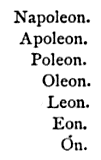Shouldn’t ENCOURAGE rhyme with ENTOURAGE?
Language
Able Was I
One French Republican, by writing and analyzing, has produced the following:–
Which, being arranged in the form of a sentence, gives, ‘Napoleon on o leon leon eon apoleon poleon‘–which is the Greek for ‘Napoleon, being the lion of the people, was marching on, destroying the cities!‘
— Appleton Morgan, Macaronic Poetry, 1872
In a Word
pauciloquent
adj. uttering few words
Sound Sense
A favorite kind of school-boy humor is that which takes the form of evolving sentences like the following: Forte dux fel flat in gutture, which is good Latin for ‘By chance the leader inhales poison in his throat,’ but which read off rapidly sounds like the English ‘Forty ducks fell flat in the gutter.’ A French example is Pas de lieu Rhône que nous, which it is hardly necessary to explain makes no sense in French at all, though every word be true Gallic, but by a similar process of reading reveals the proverbial advice, ‘Paddle your own canoe.’
— William Shepard Walsh, Handy-Book of Literary Curiosities, 1909
In a Word
kalokagathia
n. a combination of the good and the beautiful in a person
bellibone
n. a remarkably beautiful and good woman
Literary Pangrams
This excerpt from Coriolanus contains every letter of the alphabet but Z:
O, a kiss
Long as my exile, sweet as my revenge!
Now, by the jealous queen of heaven, that kiss
I carried from thee, dear; and my true lip
Hath virgin’d it e’er since.
This one, from Milton’s Paradise Lost (from the Z in grazed to the b in Both), contains all of them:
Likening his Maker to the grazed ox,
Jehovah, who, in one night, when he passed
From Egypt marching, equalled with one stroke
Both her first-born and all her bleating gods.
See Quick Brown Fox, A Biblical Pangram, A Pangrammatic Highway, and Nevermore.
All Greek
To a dining companion, William Hogarth once sent a card inscribed with a knife, a fork, and these letters:
Η Β Π
It was an invitation to “eta beta pi.”
Exasperated that Nicholas Rowe kept borrowing his snuffbox, Samuel Garth wrote these letters on the lid:
Φ Ρ
“Fie! Rowe!”
Their friend John Dennis observed, “A man who could make so vile a pun would not scruple to pick a pocket.”
Spoon River
“Lines by an Oxford Don,” from the Globe, June 1805:
My brain was filled with rests of thought,
No more by currying wares distraught,
As lazing dreamily I lay
In my Canoodian canay.
Ah me, methought, how leef were swite
If men could neither wreak nor spite;
No erring bloomers, no more slang,
No tungles then to trip the tang!
No more the undergraddering tits
Would exercise their woolish fits
With tidal ales (and false, I wis)
Of my fame-farred tamethesis!
A sentence that makes equal sense when spoonerized: “I must brush my hat, for it is pouring with rain.”
When George S. Kaufman’s daughter told him a friend had eloped from Vassar, he said, “Ah! She put her heart before the course.”
Quick!
Obey this command!
In a Word
humicubation
n. the act of lying on the ground

